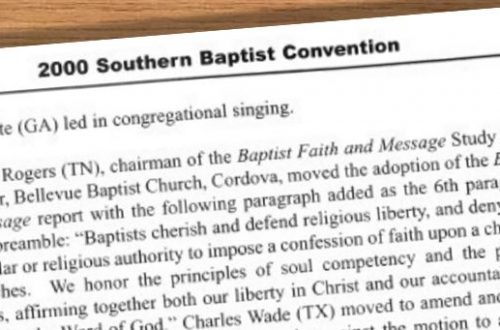 Last week, I wrote about two different groups petitioning the President about a forthcoming Executive Order (EO). News reports said that the EO would prohibit government contractors from discriminating on the basis of sexual orientation or gender identity. A group of prominent religious leaders wrote the President asking him to include religious exemptions, but a group of legal scholars wrote asking him to do the opposite.
Last week, I wrote about two different groups petitioning the President about a forthcoming Executive Order (EO). News reports said that the EO would prohibit government contractors from discriminating on the basis of sexual orientation or gender identity. A group of prominent religious leaders wrote the President asking him to include religious exemptions, but a group of legal scholars wrote asking him to do the opposite.
The big question was this. Who would he listen to? Would the President include religious exemptions or not? I finished my final post saying that I didn’t know which way the President would go. Well, now we know.
BuzzFeed has obtained a copy of the President’s EO, which he will likely sign later this morning. You can read it here. I am not a lawyer. It is true that President Obama did not include new “wide-ranging” religious exemptions that some had wanted. But he did in fact leave in place the religious exemptions that President George W. Bush signed into law in 2002 (as was noted in earlier reports). The difficulty here is that many believe the Bush exemptions to be too narrow in scope. Here is how the current exemption reads:
This Order shall not apply to a Government contractor or subcontractor that is a religious corporation, association, educational institution, or society, with respect to the employment of individuals of a particular religion to perform work connected with the carrying on by such corporation, association, educational institution, or society of its activities. Such contractors and subcontractors are not exempted or excused from complying with the other requirements contained in this Order.
What does all this mean? President Obama could have rescinded the religious exemptions from President Bush’s EO, but he didn’t. That is a good thing.
Nevertheless, the exemption will likely be insufficient for many religious groups. As The New York Times reported last week:
But some groups wanted Mr. Obama to go further to protect religious groups in carving out an exception. One example of such protections would allow a Catholic charity that believes sex outside heterosexual marriage is a sin to keep its government financing if it declined to hire a gay man.
The old Bush exemption may very well be in place, but it would not help a Catholic charity in the above situation. So this EO is sticky. It is the administration’s version of ENDA (which is highly problematic), and it signals what standard the administration wishes for Congress to impose on the rest of the country. Right now, ENDA is dead in the water, but that could change in the next Congress.
UPDATE: Ryan Anderson has a helpful analysis in which he enumerates four problems with this executive order and one response. You should go read the entire piece, but here’s a summary:
1. Today’s order undermines our nation’s commitment to reasonable pluralism and reasonable diversity, as it disregards the consciences and liberties of people of goodwill who happen not to share the government’s opinions about issues of sexuality…
2. Today’s order treats conscientious judgments about behavior as if they were insidious acts of discrimination akin to racism or sexism…
3. Today’s executive order also does not contain a Bona Fide Occupational Qualification (BFOQ) exemption…
4. Today’s executive order is unnecessary. Voluntary market forces are already eliminating true discrimination…
5. Policy should prohibit the government from discriminating against any individual or group, whether nonprofit or for-profit, based on their beliefs that marriage is the union of a man and woman or that sexual relations are reserved for marriage…
UPDATE: President Obama has now signed the order (see below). You can read the official text of the order here.




8 Comments
Ryan Davidson
I’m not sure that the EO does what you say it does. The exemption allows religious organizations to discriminate “with respect to the employment of individuals of a particular religion.” In other words, a Christian organization can limit its hiring to Christians, a Hindu organization can limit its hiring to Hindus, etc.
So, the EO would not allow organizations to discriminate specifically on the basis of sexual orientation. Rather, the organization would have to do so indirectly by limiting its hiring to members of certain religions or certain churches within religions that themselves exclude members on the basis of sexual orientation.
For example, if Gordon College routinely hires members of certain mainline Protestant churches, it could not hire straight members of the church and simultaneously exclude gay members of the same church. Or Gordon College may be able to establish its own religious creed that requires exclusion on the basis of sexual orientation. Even so, Gordon would need to require that all employees assent to the creed, not merely that they conduct themselves in accordance with it. Thus, if Gordon wants to exclude gay people as non-Christians, it would also need to require that all employees agree with the creed, i.e., agree that gay people are necessarily not Christians.
Brian Watson
“President of Gordon Conwell” should read, “President of Gordon College.” Also, I think Ryan’s observations are accurate. The language of that paragraph forces an entity like Gordon to argue that homosexuals are not Christians. Interesting debates would follow, and though Gordon et al. could make strong theological arguments, they probably wouldn’t be recognized by the courts.
Ryan Davidson
I suspect that restrictions based on “religion” would withstand scrutiny. Calvin College, for example, requires employees to be members in good standing of a Christian Reformed Church. Such a restriction would presumably allow the college to avoid hiring practicing homosexuals, even without explicitly discriminating on that basis.
It’s a bit trickier for colleges like Gordon or Wheaton, which have avoided placing themselves under any kind of ecclesial authority. In that sense, they are more Christian-themed colleges than explicitly Christian colleges.
This suits me fine. I believe that all “Christian” educational institutions should be answerable to duly appointed ecclesial authorities.
Denny Burk
Please note the updated version of the post. I removed the portions about the original reporting being “misleading.” I still think some of that reporting was misleading, but I think it was a rabbit trail to mention it. So I removed it.
buddyglass
One example of such protections would allow a Catholic charity that believes sex outside heterosexual marriage is a sin to keep its government financing if it declined to hire a gay man.
I have two issues with this concern:
1. Who says a Catholic charity that believes sex outside of heterosexual marriage is a sin should not hire a gay man if said gay man is committed to life-long celibacy, in thought and deed, until such time as God reorders his desires and he is able to faithfully marry? If the charity sought to discriminate against such a person then I agree it would not be protected by the Bush exemption, but I’d argue this is a good thing.
2. If the gay man in question is sexually active and has no desire to become celibate then the charity may well be protected under the Bush exemption by virtue of the argument that the man’s unrepentant sexual sin places him outside their faith. I look forward to such an argument being advanced in court. (Which I expect it will be, sooner or later.)
Ryan Davidson
Anderson predictably overreacts. I have no sympathy for organizations that claim to be relying on religious convictions to avoid hiring gay people, even while those same organizations hire straight people who otherwise fail to share those convictions. In other words, I have no sympathy for an evangelical organization that wants to fire a mainline Protestant practicing lesbian, even while it retains the lapsed Catholic single dude who lives with his girlfriend.
The EO allows religious organizations to discriminate on the basis of religion. The EO prevents religious organizations from discriminating against gay people on religious bases and simultaneously disregarding those religious bases as to every other employee.
This strikes a fair balance between what the liberal law professors were requesting and what certain social conservatives wanted.
Pingback:
Pingback: